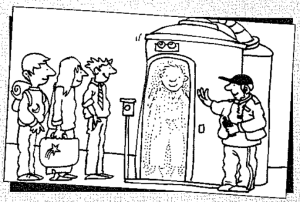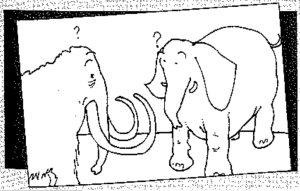Lesson 24 – It will never happen
Warm up
- Think of examples of inventions or scientific discoveries since your grandparents were young.
- Which do you imagine your grandparents thought were more useful and most surprising?
- Think of examples that have happened in their own lifetime.
- Which do you think are more useful and most surprising?
Main Activity
- Tell students that they are going to read about inventions and discoveries that might happen in the future. Put them in groups of four.
- Ask them to read the paragraphs. Tell them to underline any words they do not know and ask the other students in their group about them.
- Check if there are still any unknown words. Invite other students to explain them before you give the meanings yourself.
 | B Machines take over: robots rule the world Scientists are designing better robots and more intelligent computers every day. There is already a computer that can beat chess champions and programs that can learn for themselves. Many experts believe machines will be more intelligent than humans one day, and when they are they will not need us anymore. Goodbye, humans!  |
 |  |
 |  |
- Ask them Answer key1 A, D 2 B 3C, E 4D, F
- Ask them to think about the paragraphs on their own without talking to their partner. Tell them to decide which are more probable and write numbers 1 to 6 next to them. Number 1 is the most probable, number 2 is the next most probable, and so on; number 6 is the least probable.
- Ask them to talk with the others in their group and compare the numbers they gave to each paragraph. They should explain their opinions and try to agree who is right.
- Ask if any groups were able to agree about all the numbers for the paragraphs. Compare the order decided by different groups. Were there any big differences? Ask them to explain their opinions.
Follow up
- In their groups, students brainstorm the technical advances described in the text and try to think of as many advantages and disadvantages for each as they can.
- Compare ideas around the class and see who has thought of most and which are the most interesting.